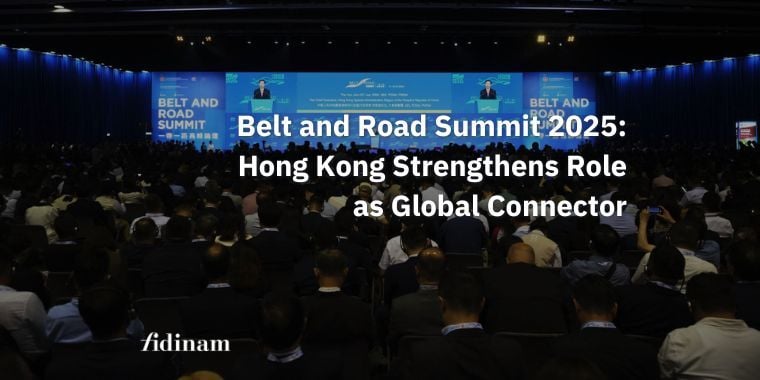
The Belt and Road Summit 2025, held on 10 and 11 September in Hong Kong, brought together policymakers, investors, and industry leaders across Asia, the Middle East, and beyond — all with a shared goal: navigating economic uncertainty through cooperation, connectivity, and sustainable development.
With over 150 Belt and Road countries represented, the event reaffirmed Hong Kong’s unique position as a platform for capital, talent, and innovation along the Belt and Road Initiative (BRI).
A key focus was on ASEAN’s transformation from a peaceful union to an increasingly integrated economic bloc of 11 countries and over 700 million people. Intra-ASEAN trade is being bolstered by shared legislation, simplified customs processes, and growing cross-border mobility. AirAsia, for example, has become a leading logistics player connecting Southeast Asia with China — a direct enabler of SME commerce, tourism, and e-commerce.
Infrastructure remains central to ASEAN’s development, with Chinese conglomerates like CITIC Group actively involved in sectors ranging from oil & gas to agriculture innovation. CITIC’s localization strategies — from employing local staff to tailoring financial services — illustrate the value of understanding each country’s legal, regulatory, and cultural nuances.
Hong Kong, with its common law system, freely convertible currency, and financial depth, is proving indispensable to Chinese companies expanding into ASEAN — and to ASEAN companies eyeing China. As Tony Fernandes, CEO of Capital A (AirAsia), put it: "The infrastructure phase of BRI is over — now it’s about connectivity and digitalization."
ASEAN’s digital transformation has taken cues from China’s tech ecosystem. The region is quickly moving towards super apps, digital payments, and FinTech platforms akin to Alipay and WeChat. Hong Kong’s role here is not just financial — it’s technological.
The city is emerging as a digital project hub supporting initiatives beyond BRI: from supply chain digitization to tokenization of real-world assets. Projects like Thailand’s EECiti Smart City in Chonburi — a USD 36.5 billion “Bangkok 2” — exemplify the fusion of innovation, infrastructure, and quality of life. Hong Kong’s engineering, legal, and financial expertise plays a crucial role in turning these visions into reality.
The Belt and Road’s pivot towards the Middle East was unmistakable this year. Saudi Arabia, Qatar, Oman, and Kuwait presented bold visions of economic diversification — moving beyond hydrocarbons to finance, logistics, AI, and renewable energy.
From Saudi Arabia’s 400+ regulatory reforms to Oman’s Round 3 Green Hydrogen Auction, governments are creating investor-friendly environments. Qatar’s China LUYI Industrial Park and Kuwait’s Al Abdali Economic Zone offer 100% foreign ownership, fast-track licensing, and fiscal incentives for companies willing to partner long-term.
The message was clear: success in the Middle East hinges on localisation, respecting cultural norms, and employing local talent. Companies from China and ASEAN were encouraged to build trust through sustained presence, not transactional deals. And once again, Hong Kong is positioned as a bridge — offering financial structuring, legal support, and market access.
One of the standout themes at the summit was the growing integration of capital markets across Belt and Road economies — with green and Islamic finance taking center stage.
Hong Kong — already the leader in Asia’s green finance market — holds a 45% regional share. The city has introduced Asia’s first green ETFs and retail green certificates, while also facilitating RMB 100 billion in trade finance for BRI projects.
On the Islamic finance front, Hong Kong is gaining traction. It has already issued three government Sukuk in USD, and in 2024, recognized Islamic finance as a formal profession, paving the way for global expertise to enter the city. Collaboration with Malaysia, Indonesia, and Gulf countries is fostering development of Islamic ESG instruments, cross-border Sukuk, and new platforms for green infrastructure investment.
Speakers from Qatar National Bank, Bank Negara Malaysia, and the Bank of China emphasized the strategic alignment between Islamic finance principles and BRI infrastructure goals, especially in sectors like renewable energy and smart cities.
While physical infrastructure often gets the headlines, legal infrastructure is just as critical. In a dedicated breakout session on legal excellence, Hong Kong’s role as a common law anchor within China was strongly reaffirmed.
Under the "one country, two systems" model, Hong Kong maintains independent courts, a bilingual legal system, and internationally recognized arbitration standards. New agreements with Saudi Arabia and Qatar aim to increase the use of Hong Kong law and arbitration in Belt and Road contracts — including in the Greater Bay Area (GBA).
Notably, Hong Kong is leading in emerging legal areas like stablecoins, smart contracts, and digital asset arbitration. Recent regulations on digital asset trading and tokenization standards have helped position the city as a secure and compliant hub for financial innovation.
For entrepreneurs and investors looking to expand across Asia and the Middle East, Hong Kong remains a strategic launchpad where ideas, innovation and partnerships take root.
The Belt and Road Summit 2025 made it clear: the BRI has evolved. It’s no longer just about railways and ports — it's about ecosystems of trust, digital infrastructure, and cross-border collaboration.
For companies based in Europe or elsewhere looking eastward, now is the time to leverage Hong Kong’s unique strengths to access opportunities in ASEAN, the Middle East, and Mainland China. Whether you're in infrastructure, green energy, finance, or digital innovation — Hong Kong continues to be Asia’s super-connector.
At Fidinam, we support businesses and individuals navigating cross-border opportunities across Asia Pacific, the Middle East, and Europe. From market entry and company setup to ongoing compliance, tax planning, and wealth structuring — our integrated solutions are designed to help you operate efficiently and grow with confidence.
Whether you're expanding into ASEAN, exploring investment in the Middle East, or leveraging Hong Kong as your strategic base, our team is here to guide you. Get in touch to explore how we can support your next step.
All content © . All Rights Reserved.